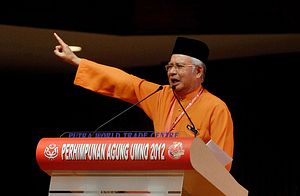In a recent article in The Diplomat, a Malaysia-watcher argued that Prime Minister Najib Razak’s moves to politically join hands with Parti Islam Malaysia (PAS) will mean the end of the ruling BN’s “decades-long tradition of narrowing ethnic and religious divides.”
This viewpoint is erroneous. I would argue that the entire setup of BN was never meant to narrow the ethnic and religious divide, but rather cement the ideology of Ketuanan Melayu (Malay supremacy), and in recent times Ketuanan Islam (Islamic supremacy). In practice this meant the UMNO staying in power at the federal level in perpetuity. Najib’s move to get close to PAS may be prompted by the 1MDB affair but in reality, the signs are clear: in the long run, with or without Najib, UMNO will move toward the Islamic ground.
1969 and the Rise of Barisan Nasional
After the 1969 racial riots, the UMNO Malay elites (and a sizable number of the Malay intelligentsia) decided that treating non-Malays as political equals (i.e., the Malayan Alliance model) was a mistake. They saw the rapid development of the Malay community (“to catch up with the Chinese”) as contingent on massive government intervention in all political and economic spheres. Two crucial political events took place to ensure this.
First, UMNO told everyone that it was only willing to reconvene parliament, which had been suspended after the riots, if laws were passed to make it illegal to question the status of Islam, the special position of the Malays, the Malay language, and the Malay sultans. Second in 1973, the Malayan Alliance was reconstituted as the Barisan Nasional (National Front) with UMNO as first among equals.
The first move meant even the Malaysian parliament could not discuss issues related to Malay supremacy or the institutional racism created by the New Economic Policy (NEP). The second move created a governing coalition that, while multi-racial and multi-religious on paper, was in effect simply a political vehicle for UMNO to dominate the federal government while paying lip service to leading a multi-ethnic coalition. That is the reason why in the BN, you can have countless non-Malay parties but only one Malay party. The non-Malay parties were politically marginalized under the new BN coalition.
In every general elections since the late 1970s, the bulk of Chinese votes have gone to the opposition. To date, the overwhelmingly majority of Malaysians who migrate to other countries are non-Malays. This is a clear indication of how the non-Malays think they are being treated by the political system.
The process of cementing Ketuanan Melayu accelerated during the era of former Prime Minister Mahathir Mohamad. He not only politically further marginalized the main non-Malay parties, the Malaysian Chinese Association (MCA) and the Malaysian Indian Congress (MIC), but he also supported the infusion of “Islamic values” into the bureaucracy, thus directly aiding the rise of political Islam. No doubt Mahathir was trying to outdo PAS (Parti Islam Malaysia) but his legacy is the creation of a powerful Islamic department (JAKIM), which is trying to turn Malaysia into a Malay-Islamic country. JAKIM is the natural ally of PAS and they have a strong influence in the Najib administration with a billion-ringgit budget.
By the time Mahathir retired in 2003, the non-Malay community, on the whole, felt hopeless when it came to politics. The BN government was clear that it was practicing the “Malay/Islam-First” policy and the non-Malay BN component parties could not shake the perception that they were totally impotent when it came to the non-Malay’s quest to be treated as full citizens. Hence the 2008 “tsunami,” when more than 80 percent of the Chinese vote went to the opposition.
The rise of the Ketuanan Islam era accelerated under Najib (since 2009) for the simple reason that UMNO thinks that their path to staying in power is in the “Islamic vote.” Countless surveys have shown that the Malay community in Malaysia is becoming more conservative and places Islam above all other issues. For UMNO, the contradiction of playing the Islamic card while leading a multi-ethnic coalition and country is irrelevant, since the coalition is merely meant to project an image for UMNO. From day one, UMNO was never serious about accepting non-Malays as full citizens.
In summary, I would argue the correct way of looking at what’s happening in Malaysia is not to romanticize the BN coalition as a genuine multi-ethnic coalition but to see it for what is really has been since its formation: a political vehicle for keeping UMNO in power. Those who believe that the BN is a genuine multi-ethnic coalition have simply fallen for the slick BN propaganda.
Professor James Chin is Director of the Asia Institute, University of Tasmania.

































